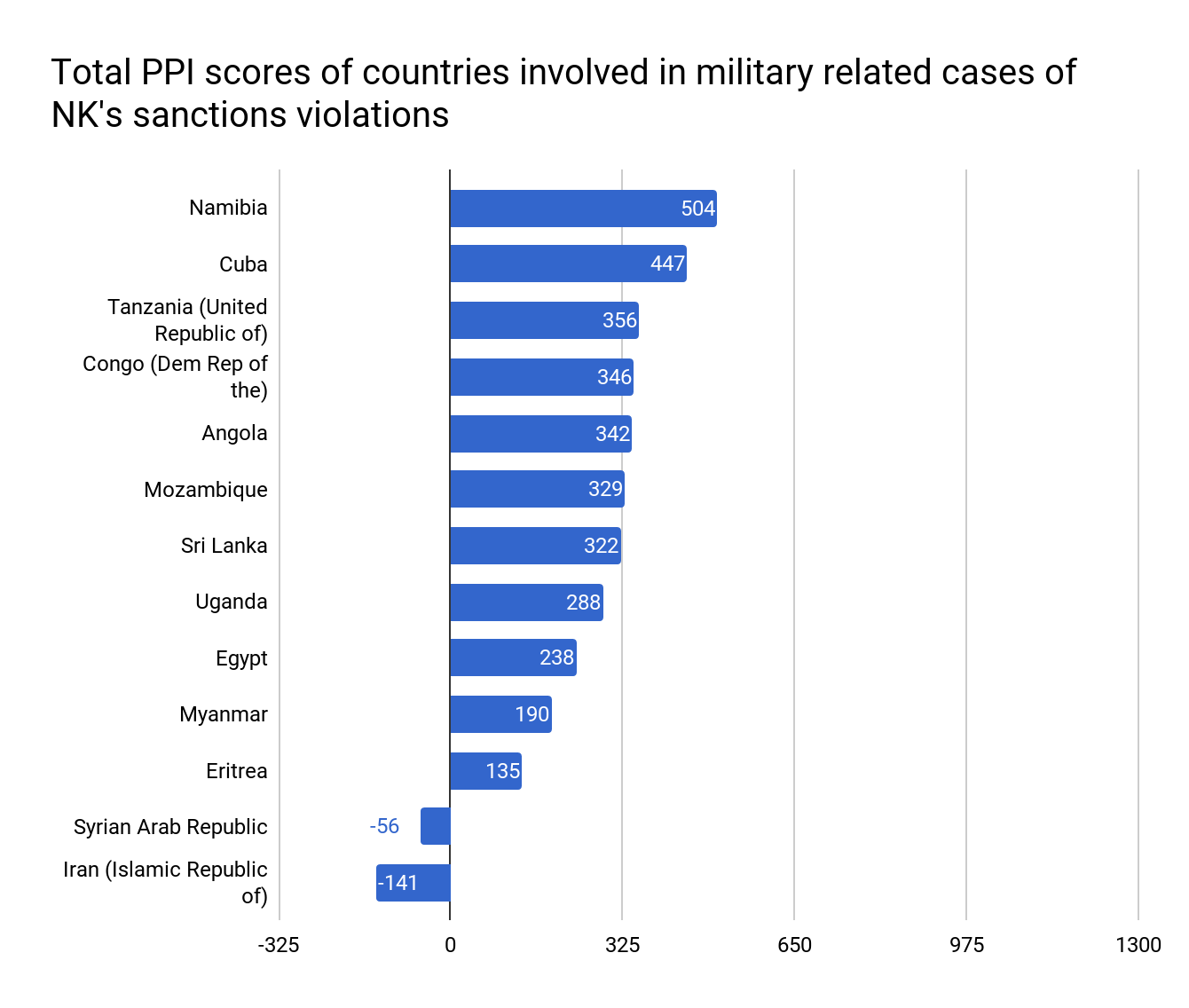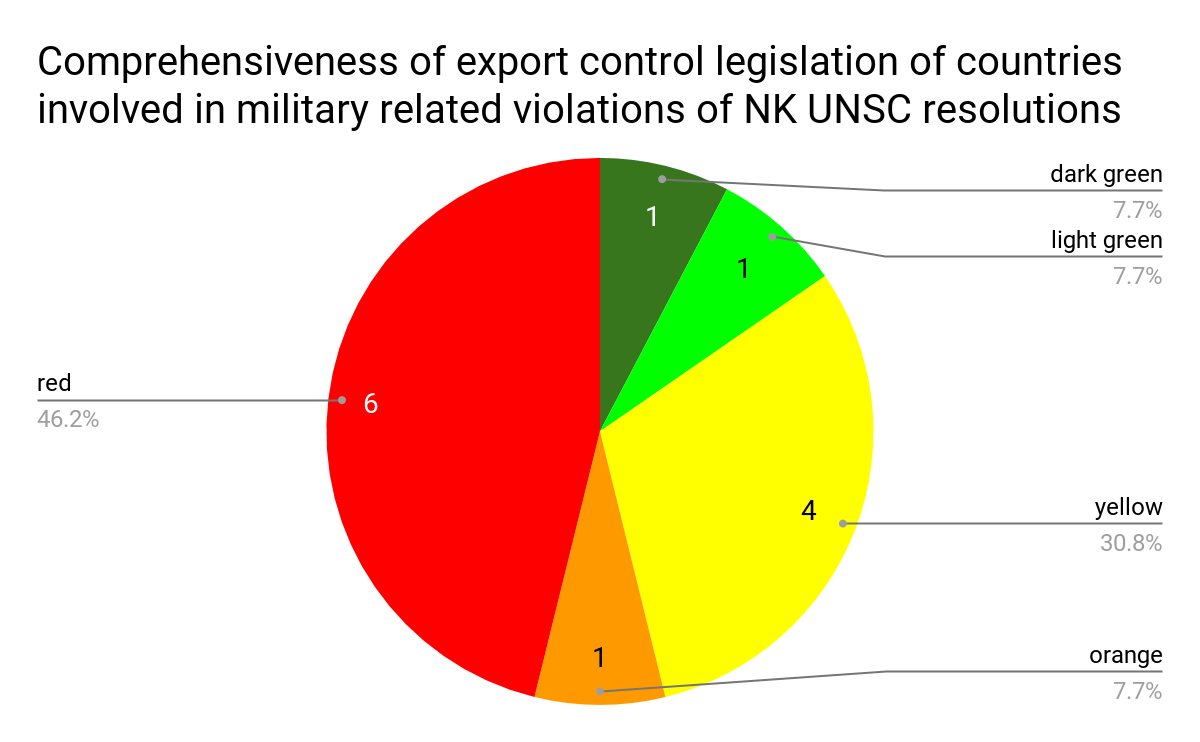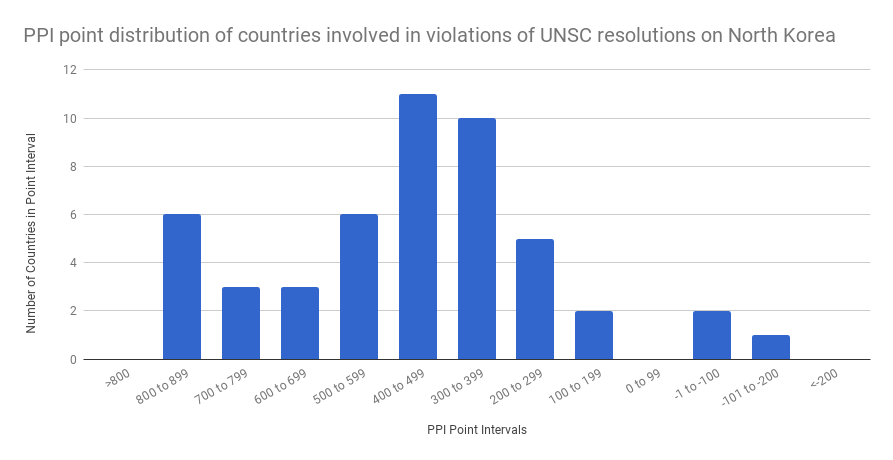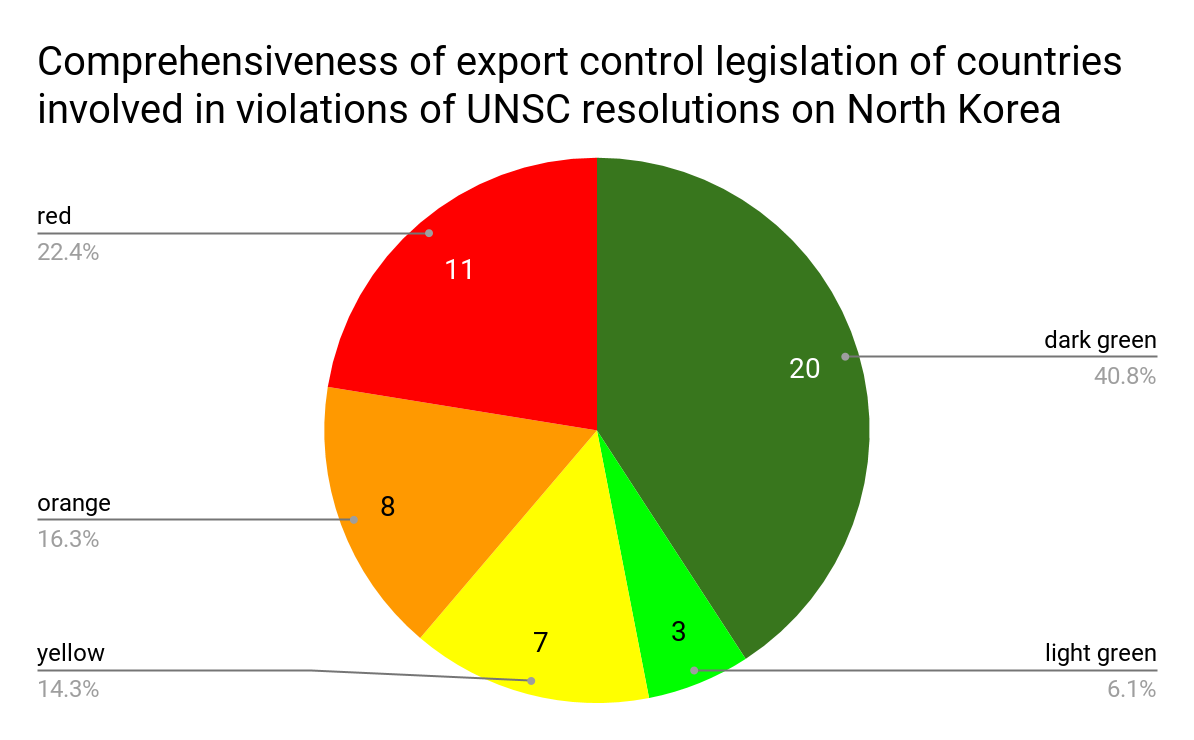Reports
Countries Involved in Violating UNSC Resolutions on North Korea
by David Albright, Sarah Burkhard, Allison Lach, and Andrea Stricker
December 5, 2017
Lede and Summary
After North Korea’s recent launch of a long-range ballistic missile, U.S. Ambassador Nikki Haley stated, “In addition to fully implementing all UN sanctions, all countries should… limit military, scientific, technical, or commercial cooperation.”1 She said, “They must also cut off trade with the regime by stopping all imports and exports, and expel all North Korean workers.”
A natural group to press to stop cooperation with North Korea includes those 49 countries that have been found to be complicit in various forms of alleged or proven violations of United Nations Security Council (UNSC) sanctions resolutions on North Korea. Because of the debate on North Korea and on states ending various types of cooperation with North Korea, we have decided to pre-publish a condensed chapter drawn from our Institute’s forthcoming Peddling Peril Index (PPI). The PPI is an index that ranks 200 countries, territories, and entities according to their capabilities and demonstrated success in implementing strategic export controls, with a focus on efforts to prevent nuclear and other strategic commodity trafficking. This chapter summarizes alleged UN sanctions violations and discusses the export control and corruption challenges affecting these countries.
Our findings indicate that in pursuing its banned or illegal activities North Korea often cooperates with or otherwise exploits countries with weak or nonexistent export and proliferation financing controls and those that suffer on average from more corruption than other countries. Although a range of remedies is needed (and recommended in this report) to fix the poor performance of many of the countries on this list and prevent other countries from doing banned business with North Korea, the creation of punitive measures is an effective means to accelerate more compliant behavior in the short term. For example, the effectiveness of international pressure can be seen in the case of Uganda, which in October expelled North Korean arms dealers after having received North Korean military cooperation for years. To that end, and in order to have an impact on North Korea’s thinking regarding its destabilizing and threatening nuclear, missile, and military programs, we support Ambassador Haley’s call for countries to end their non-humanitarian-essential trade with North Korea. Countries should be urged to expel North Korean military personnel and suspend any further military cooperation. Other countries should be pressed not to undertake military cooperation of any kind. Remittances from North Korean workers should be banned from going to North Korea, and countries should reduce the numbers of North Korean “guest workers.” The UN Security Council and major countries should accelerate the designation of individuals and entities, including banks that do business with North Korea, that violate UNSC resolutions on North Korea.
Introduction
In its efforts to further its nuclear, missile, and conventional military programs, North Korea seeks to undermine international sanctions and the export control laws of other countries. It has long attempted to find sympathetic governments or countries with weak or nonexistent export controls that will supply these programs or be more conducive to military and commercial cooperation. North Korea also targets states that are otherwise strong enforcers of export controls and uses deceptive methods, such as front companies or actors to bypass these countries’ export control laws. To better understand North Korea’s strategies and methods to defeat sanctions, the Institute collected and analyzed North Korea’s procurement activities as reported in United Nations Panel of Experts reports from March 2014 to September 2017.2 A total of 49 countries were found to be complicit in various forms of violations of UNSC sanctions resolutions on North Korea. Using the Peddling Peril Index, we considered these 49 countries in terms of 1) their overall ranking in the index; and 2) the rigorousness of their export control legislation.
Military-Related Sanctions Busting
Thirteen governments were found to be involved in military related cases of North Korean sanctions violations, including: Angola, Cuba, Democratic Republic of the Congo, Eritrea, Iran, Mozambique, Myanmar, Namibia, Sri Lanka, Syria, Uganda, and the United Republic of Tanzania. Egypt is included because it reportedly received a shipment of arms from North Korea.3 In some cases, these mostly undemocratic regimes received military training from North Korea; in others, they received or exported military related equipment to or from North Korea. This includes North Korea’s alleged export of surface-to-air missiles or related equipment to at least two African countries.4
The overall scores of these 13 countries in the PPI are low. The mean for these countries is 254 points out of 1,300 total points. A sufficient strategic export control system in the PPI typically would require a score of at least 650 points. The highest scoring country received only 40 percent of all possible points (504 out of a possible 1,300). The PPI scores are shown in figure 1.
Eleven of these 13 countries have inadequate export control legislation according to the PPI’s definitions (see below). Six of these countries have barely any export control legislation. This is shown in the pie chart in figure 2.
Legislative Categories in the PPI
In the PPI, countries are categorized into five levels of apparent comprehensiveness of their control lists as summarized below.
Dark Green (legislation is comprehensive): Export control legislation or agreements includes controls or clauses relating to nuclear direct-use and nuclear dual-use goods, (nuclear and nuclear-dual use commodity controls such as implementation of NSG Parts 1 & 2 or their equivalent), in addition to conventional weapons. The most commonly used lists are the EU Control List and Wassenaar Arrangement list.Light Green (legislation is somewhat comprehensive): Export control legislation or agreements includes controls or clauses relating to nuclear direct-use goods (nuclear commodity controls such as implementation of Nuclear Suppliers Group Part 1 list or an equivalent), in addition to conventional weapons.Yellow (legislation is deficient): These countries have comprehensive, overarching nuclear safety and security laws which place transfer controls on nuclear material and equipment. If the PPI team was unable to locate the relevant legislation, the 2016 Nuclear Threat Initiative (NTI) Nuclear Security Index was consulted, specifically its data on whether a country has or does not have a national legal framework for the Convention on the Physical Protection of Nuclear Material (CPPNM). These countries are not viewed as having effective export control laws governing nuclear and nuclear-related commodities, but their existing legislation is viewed as better in a relevant export control sense than the legislation or lack of legislation in the red and orange categories.Orange (legislation has serious deficiencies): Export control legislation or agreements include only conventional weapons as laid out under the Arms Trade Treaty. These are not considered relevant export control legislation for the PPI.Red (legislation is non-existent or severely deficient): Export controls may include small arms and light weapons (SALW), and/or radioactive materials under environmental laws. These are not considered relevant export control legislation for the PPI.

Figure 1. All 13 countries received less than 50 percent of the possible 1,300 points. Six received less than 25 percent. The mean is 254 points out of 1,300 points.

Figure 2. Six out of the 13 countries in this category have barely any or no export control legislation (red color designation). The legislation color key described qualitatively and in brief is: Dark Green- legislation is comprehensive; Light Green- legislation is somewhat comprehensive; Yellow- legislation is deficient; Orange- legislation has serious deficiencies; and Red- legislation is non-existent or severely deficient. See text for legislative categories.
High Corruption among these 13 Countries
Also noteworthy is that all of these 13 countries do poorly on the Corruption Perceptions Index (CPI) by Transparency International, which ranks 176 countries on a scale from 1 to 176, where a ranking of 176 is most corrupt.5 The above 13 countries have an average rank of 127 in the CPI. None of them ranks above 50. All except two countries rank in the bottom half of the index, and eight out of the 13 countries rank in the bottom third.
Other Alleged Sanctions Violations
Based on the project’s survey of recent UN Panel of Experts reports, a range of countries were reported as involved in other violations of North Korean UNSC sanctions, as outlined below. These alleged and proven violations were organized into three broad areas, namely non-military-related cases, imports of sanctioned goods and minerals from North Korea, and activities associated with the re-flagging of vessels and providing other assistance for shipments. In total, 44 countries, including all but five of the 13 countries with military-related violations above, were identified as involved in violations in these three other areas. Some countries had multiple violations, although the total number for each country was not tabulated.
Nineteen countries were involved in non-military related cases of sanctions violations that involved facilitating front companies, financial transactions, and other business activities. These countries include Angola, Brazil, Bulgaria, China, Egypt, Ethiopia, Germany, India, Iran, Malaysia, Namibia, Poland, Romania, Russia, Singapore, Sri Lanka, Sudan, Syria, and the United Arab Emirates.
Eighteen countries were involved in imports of sanctioned goods and minerals from North Korea, including: Barbados, China, Costa Rica, Egypt, El Salvador, France, Germany, India, Indonesia, Iran, Ireland, Malaysia, Mexico, Pakistan, Philippines, Sri Lanka, Syria, and Vietnam.
To transport these illicitly traded technologies, goods, and minerals to and from North Korea, North Korea often relies on receiving shipping assistance from other countries. Twenty countries associated with re-flagging of vessels and providing other assistance for shipments include: Brazil, Cambodia, China, Egypt, Fiji, Greece, Japan, Kiribati, Malaysia, Marshall Islands, Mongolia, Palau, Panama, Peru, Russia, Sierra Leone, Singapore, Tanzania, Thailand, and Togo.
Of those countries, Cambodia, Marshall Islands, Mongolia, and Panama, are identified as Flags of Convenience (FOC) by the International Transport Workers’ Federation (ITF). ITF defines a Flag of Convenience as “one that flies the flag of a country other than the country of ownership,” leading to little oversight and much leeway to break laws and regulations.6 Flags of Convenience have just recently been declared a national security risk by the Australian government, because “there are features of FOC registration, regulation and practice that organized crime syndicates or terrorist groups may seek to exploit.”7
The UN reports surveyed by the project list other sanctions violations that are not included in this analysis because the participation of the countries appears entirely inadvertent. The following 13 countries and territories were targeted by North Korea to procure equipment with potential military applications: Canada, China, Czech Republic, Denmark, Egypt, Hong Kong, Japan, Malaysia, Russia, Singapore, Switzerland, Taiwan, United States.
Taking Stock
In total, 49 countries were identified as involved in sanctions violations in one of the four areas discussed above. Some countries had multiple violations, although the total number for each country was not tabulated.
These 49 countries have a mean score in the Peddling Peril Index of 458 out of 1,300 points, again a relatively low average. Figure 3 shows the PPI score distribution, where there is a maximum peak in the 300-499 point intervals. This peak reflects that many of the countries involved in sanctions violations in general lack sufficient strategic export controls. Thirty nine out of the 49 countries scored fewer than 50 percent of the overall points assigned in the PPI, a mark of less than sufficient export controls, and ten scored less than 25 percent. Moreover, it should be noted that there are many other countries that have received similar or lower PPI scores, making them potentially more vulnerable to North Korean exploitation.
Half of the 49 countries that were involved in violating UNSC resolutions on North Korea have poor export control legislation, and many of the countries that do have sufficient legislation have a high degree of corruption relative to their peers, as measured by the CPI. Figure 4 shows that out of 49 countries, 26 have inadequate export control legislation, categorized as red, orange, or yellow colors.
In total, 20 countries out of the 49 involved in violations of UNSC resolutions on North Korea have dark green color-coded export control legislation, which means their legislation is judged as comprehensive. However, many of the 20 countries listed show a higher degree of corruption on the CPI compared to other dark green countries. Their average CPI rank is 63 out of 176, with a median of 63. For all dark green countries in the PPI the average CPI rank is 54 and the median is 47.

Figure 3. Distribution of PPI scores for the 49 countries that were involved in violating UNSC sanctions on North Korea.

Figure 4. This pie chart shows the comprehensiveness of export control legislation of all 49 countries identified as involved in violations of UNSC sanctions resolutions on North Korea. Anything but green is considered inadequate legislation in the PPI. (This figure excludes 13 countries that were targeted by North Korea using illicit procurement schemes to procure equipment with potential military applications).
Recommendations
The UN Security Council and major countries should accelerate the designation of individuals and entities that violate UNSC resolutions on North Korea. Countries that have engaged with North Korea in arms trade and military training should be urged to expel North Korean military personnel and suspend any further cooperation. Other countries should be discouraged from starting any such cooperation. The effectiveness of international pressure in achieving this goal can be seen in the case of Uganda, where military and police forces had received training from the North Korean army for years. Nonetheless, recently Uganda “expelled North Korean military experts and representatives of North Korean companies…as African nations face growing pressure to comply with UN sanctions over Pyongyang’s nuclear weapons program.”8 The United States and Europe in particular should press every country engaged in military or sanctioned trade with North Korea to stop any such activities and deploy their own sanctions designations against those that fail to do so.
The UN Panel of Experts on North Korea has made a series of excellent recommendations in their reports on limiting North Korea’s abuse of shipping, transshipping, and financial transactions, and better identifying entities for sanctioning.9 One panel recommendation urges all members to implement catch-all clauses in national export controls. Given that more than 50 percent of UN member states are judged in the PPI as not having sufficient export legislation in general, and about 25 percent barely have or do not have export control laws, this recommendation needs supplementing. Especially for the countries identified in this report as having barely any or no relevant legislation, they should establish strategic export control laws that include bans on sanctioned trade with North Korea and other pariah states, as the panel also recommends.
Based on our analysis, we offer several other targeted recommendations relevant to export control implementation:
Countries that have violated the UNSC resolutions with respect to financing should turn to the Financial Action Task Force (FATF), its regional bodies and guidelines, and specifically ask for assistance in implementing FATF recommendation 7 as laid out in its updated 2012 framework. This recommendation states: “Countries should implement targeted financial sanctions to comply with United Nations Security Council resolutions relating to the prevention, suppression and disruption of proliferation of weapons of mass destruction and its financing. These resolutions require countries to freeze without delay the funds or other assets of, and to ensure that no funds and other assets are made available, directly or indirectly, to or for the benefit of, any person or entity designated by, or under the authority of, the United Nations Security Council under Chapter VII of the Charter of the United Nations.”10
Countries that imported large quantities of minerals or ore or other controlled goods should increase physical inspections of incoming shipments, especially from ships under Flags of Convenience or other flags that have been used by North Korea before.
Countries that have provided shipment assistance to North Korea should re-evaluate and, if violations exist, ban North Korea’s access to their flags and registries.
Overall, the results suggest that North Korea has often targeted countries with weak or nonexistent export and proliferation financing controls and those that suffer on average from more corruption than other countries. Although a range of remedies are needed to fix the poor performance of many of the countries identified in this report as involved in sanctions violations, the creation of punitive measures is an effective means to accelerate more compliant behavior in the short term not only in these countries but among all countries that may do business with North Korea.
1. Carol Morello and Simon Denyer, “U.S. calls on all nations to completely sever ties with North Korea,” The Washington Post, November 29, 2017, https://www.washingtonpost.com/world/national-security/us-calls-on-all-nations-to-completely-sever-ties-with-north-korea/2017/11/29/64d141aa-d55b-11e7-a986-d0a9770d9a3e_story.html?utm_term=.b97dce17eb06 ↩
2. UN Panel of Experts reports 2014 - 2017. All reports can be found on the website of the United Nations Security Council Subsidiary Organs: 1718 Sanctions Committee (DPRK), Panel of Experts reports , https://www.un.org/sc/suborg/en/sanctions/1718/panel_experts/reports ↩
3.Joby Warrick, “A North Korean ship was seized off Egypt with a huge cache of weapons destined for a surprising buyer,” The Washington Post, October 1, 2017, https://www.washingtonpost.com/world/national-security/a-north-korean-ship-was-seized-off-egypt-with-a-huge-cache-of-weapons-destined-for-a-surprising-buyer/2017/10/01/d9a4e06e-a46d-11e7-b14f-f41773cd5a14_story.html?tid=a_inl&utm_term=.b879ddf1b124 ↩
4. They were Mozambique and Tanzania. See http://www.un.org/ga/search/view_doc.asp?symbol=S/2017/742 ↩
5. Transparency International, Corruption Perceptions Index 2016, https://www.transparency.org/news/feature/corruption_perceptions_index_2016#table ↩
6. International Transport Workers’ Federation, “Flags of Convenience,” Transport Sectors, Accessed October 2017, http://www.itfglobal.org/en/transport-sectors/seafarers/in-focus/flags-of-convenience-campaign/ ↩
7. International Transport Workers’ Federation, “Australian Senate Inquiry Finds Flag of Convenience Shipping Poses Serious Risks To National Security,” ITF Press Releases, July 19, 2017, http://www.itfglobal.org/en/news-events/press-releases/2017/july/australian-senate-inquiry-finds-flag-of-convenience-shipping-poses-serious-risks-to-national-security/ ↩
8. Rodney Muhumuza, “Uganda expels North Korea military experts over UN sanctions,” Associated Press. October 20, 2017, https://apnews.com/9dbf7a31e93e414f8db339021be6d30f ↩
9. UN Panel of Experts reports 2014 - 2017. All reports can be found on the website of the United Nations Security Council Subsidiary Organs: 1718 Sanctions Committee (DPRK), Panel of Experts reports https://www.un.org/sc/suborg/en/sanctions/1718/panel_experts/reports ↩
10. 2012 FATF Recommendation 7: Targeted financial sanctions related to proliferation. See: http://www.fatf-gafi.org/media/fatf/documents/recommendations/pdfs/FATF_Recommendations.pdf ↩

 twitter
twitter